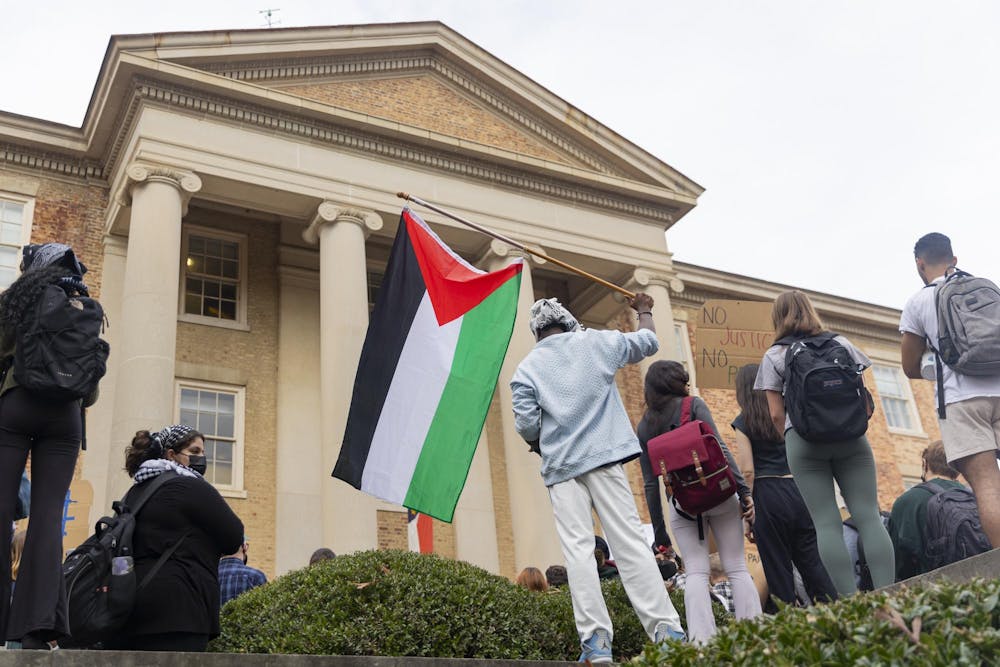In the complaint's second referenced incident, it alleges that UNC has been "silent" as Palestinian and pro-Palestinian students endure bullying and harassment.
"The university has also failed to take any apparent action to protect students who have faced doxing, harassment, and threats as a result of their actual or perceived Palestinian identity or affiliation," the complaint said.
The complaint referenced UNC religious studies professor Evyatar Marienberg, who shouted “Nazis” at students during a pro-Palestine demonstration on Oct. 12. Students and faculty then reported Marienberg to UNC's Equal Opportunity and Compliance Office, but their concerns were dismissed, according to the complaint. The DTH was unable to verify this information at the time of publication.
The final incident examined UNC's Board of Trustees “racist crusade” against SJP, raising concerns about multiple comments made by trustee Marty Kotis. In emails obtained by The DTH to UNC administration and other trustees, Kotis communicated a need to translate Arabic speeches at protests to ensure threats of violence were not communicated and raised concerns over protestors wearing masks at SJP rallies.
Comments from administration
Kotis also pushed for students who attended a November Sit-in at South Building to receive academic sanctions, potentially leading up to expulsion.
In an interview with The DTH, Kotis said the comments in his emails refer to the violation of UNC System Policy 1300.8, which promotes free speech unless the activity is illegal or involves “material and substantial disruption.”
“My concern isn't really around any of the ideology behind this,” he said. “It's simply in terms of what the group is doing when they're violating free speech.”
Kotis said disruption of meetings, failure to leave and harassment can result in academic sanctions and potential criminal charges. He said the repeated incidents — including the occupation of South Building and interruptions at BOT private meals and a recent meeting — escalated the situation with SJP.
While people are free to discuss what they think should be occurring on campus, Kotis said they must do so in a way that does not harass, threaten or lead to violence against the community.
UNC Media Relations said in an email statement that the University has not been notified by the OCR about the complaint.
“We will cooperate fully with any requests for information from OCR and remain committed to promoting a safe and equitable environment to all members of the Carolina community that is free from harassment and discrimination,” they said.
To get the day's news and headlines in your inbox each morning, sign up for our email newsletters.
Proposed remedies and next steps
UNC law professor Erika Wilson said these types of complaints aren’t new for the University.
A similar complaint was filed in December, resulting in an ongoing investigation into the discrimination of Jewish students.
Title VI complaints usually progress after investigators determine their validity and see if the alleged complaints violate the law, Wilson said. Usually, the investigator gives the parties a chance to reach an agreement and resolve the complaint and if unsuccessful, the OCR will determine whether the complaint is valid.
The OCR has not yet begun an official investigation. In a statement by an Education Department spokesperson, the OCR said its office will not comment on a pending case.
The complaint listed three remedies the OCR should require of the University. First, it stated UNC should ensure equal access to services for Palestinian students and establish a mechanism, such as an advisory committee, to voice their concerns.
UNC should also cease discriminatory investigations of Palestinian groups, individuals and allies, according to the document. It proposed anti-Palestinian and anti-Arab racism training to be instituted to prevent further investigations.
Finally, the complaint demanded that UNC issue a public statement explicitly condemning anti-Palestinian discrimination and apologize for its treatment of Palestinian students.
College campuses have historically been "crucial terrain" for a wide range of social and political movements, SJP said in the press release. For decades, students have held numerous events to protest key issues and inform the greater community on topics they are passionate about while encouraging their universities to institute change.
“The University has a duty to protect ALL of its students,” SJP said in the press release. “The rights of every student at the university, no matter their national identity, must be upheld and protected."
@dailytarheel | university@dailytarheel.com



